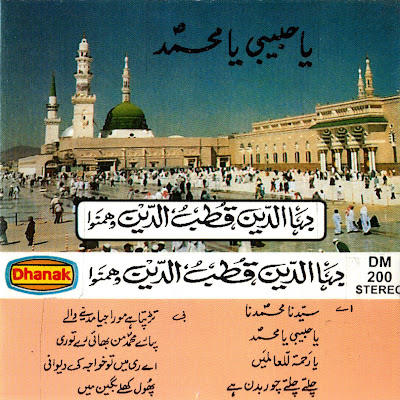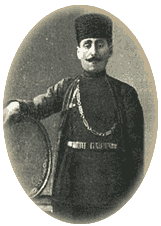We start here to post a series of three LPs, published in Azerbaijan in 1991, with historical recordings from the beginning of last century by three of the greatest Mugham singers of those times. We start with the most famous: Cabbar Qaryagdioglu (his name is also written as Jabbar Garyagdyoglu).
"Jabbar Garyagdyoglu (Jabbar Mashadi Ismayil oglu’s stage name) was born on 31th of March in 1861 in Shusha and died on 20th of April in 1944 in Baku. The khanende (singer) is one of the eminent khanendes who played a big and important role in Azerbaijan music history. A newer stage of khanendes school is closely bound with his name. Jabbar Garyagdyoglu got his education in Shusha in Kharrat Gulu’s class.
Having a very wide diapason and charming voice he was compared with the well-known italian singer Caruso. Russian poet Sergey Yesenin called him “The prophet of Eastern music”. Getting well-known in Karabakh, Ganja, Shirvan, Baku mugam meetings Jabbar also became famous in Iran, Transcaucasia and in Middle East countries.
Jabbar Garyagdyoglu was the first in music histort who sounded mugam from theater and concert stages. Thus, in 1897 Jabbar Garyagdyoglu was the performer of Majnun in “Majnun over Leyli’s grave” by Abdurrahim bey Hagverdiyev.
Khanende Jabbar created a trio which included in it tar player Gurban Primov, and kamancha player Sasha Oganezashvili and this trio performed for 20 years. During 1906-1912 Jabbar Garyagdyoglu’s performs was recorded by the “Sport-Record”, “Ekstrafon” and “Grammafon” stockholder companies in Moscow, Warsaw and in Kiev.
Returning from Warsaw in 1912 he gave “Sharg konsertileri” (“Eastern concerts” name of program) in Moscow. Different from former artists Jabbar firstly sang gazals (poems) in mugams and tasnifs in Azerbaijan language. “Istekanin deshilsin”, “Tiflisin yollari”, “Irevanda khal galmadi”, “Nakhchivanin gediyinden asheydim” tasnifs was created by Jabbar.
Jabbar Garyagdyoglu was the winner of the Transcaucasia Art Olympiad held in Tiflis (|Tbilisi) in 1934. Seyid Shushinski, Bulbul, Khan Shushinski, Zulfi Adygozelov and many others continued Jabbar Garyagdyoglu’s traditions."
from: http://www.mugamradio.az/performers/khanendes-singers/jabbar-garyagdyoglu
The recordings on this LP were made between 1905 and 1915.
Side 1:
1. Simai-Shems (2:46)
2. Mensuriyye (3:04)
3. Xumar Oldum (3:03)
4. Gyl Achdi (2:55)
5. Yetim Segah (3:13)
6. Deshti Tesnifi (3:03)
7. Manendi-Moxalif (2:44)
8. Mahur Tesnifi (2:58)
Side 2:
1. Qargamisham (3:08)
2. Mahur Tesnifi (3:08)
3. Arazbari (3:02)
4. Bayati Qacar (3:24)
5. Mirza Hüseyn Segahi (3:03)
6. Mahur Tesnifi (3:57)
7. Qarabag Shikestesi (4:07)
Many thanks to Danny for bringing this LP from Azerbaijan.

















































